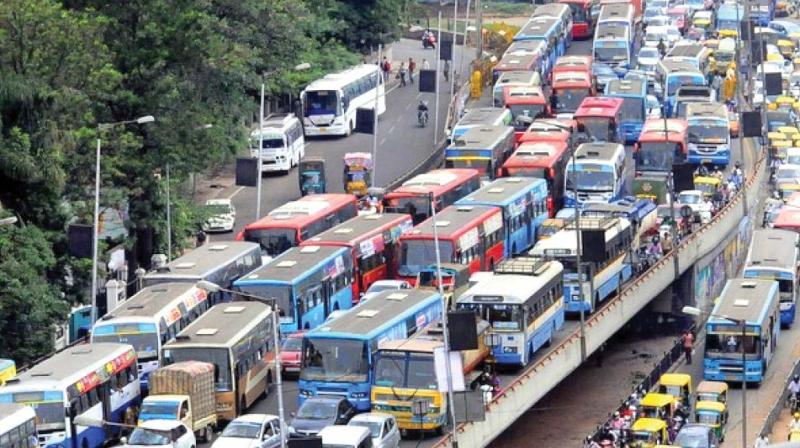By 2030, pollutants will go down in Bengaluru: Study
Of the four policy bundles, bundle 3 was expected to be most effective.

Bengaluru: The good news is by 2030 and 2050, the amount of emission and pollutants, except for carbon dioxide, is estimated to go down in Bengaluru, with no changes to current government policies and transport systems. The bad news is that traffic and congestion will multiply in these years, as vehicle volumes are expected to increase, reveals the 'Climate Change Mitigation and Adaptation Policies from Transport Sector for Bengaluru', an Indo-Norwegian Project done by the Indian Institute of Science. Principal Investigator Dr Ashish Verma, IISc said, "The emission standards of engines are improving and are already at BS-4 level. In the future, they will use BS-6 and 7 and we can predict that the emission of carbon monoxide and particulate matter will go down. Carbon dioxide will shoot up by 300-400% however, as car owners will buy vehicles of higher CC leading to more emission."
He said, "Though most local pollutants will reduce, the Bengaluru traffic will increase as Vehicle Kilometres Travelled (VKT) goes up. The study found that average trip length, per person, in private and public transport, will shoot up to 17.41 km and 16.36 km respectively by 2030" The research done in 2008, in coordination with the Norwegian Institute of Transport Economics and Meteorological Institute, took 2030 and 2050 as base years. In 2008, VKT was 31 million km. In 2030 and 2050, it will go up to 48 and 72 million kilometres, the graph states.
“Just adding more Metro lines and buses won't help. This project aims to find the best policy model by adapting better transport methods, including at times of flooding. The research predicts increased use of BMTC and Metro in the future, but sees worsening gridlocks. The proposed solution will be submitted to DULT, BBMP, BMRCL, BMTC, BTP, state and central governments with guidelines on how to implement it," he said, adding that often research submitted to the government does not see reality, due to top-down approach. Technocrats fail to tell all bureaucrats what is right and wrong, he lamented.
Of the four policy bundles, bundle 3 was expected to be most effective. This includes increased public transit, car-restricted roads, congestion pricing of Rs 10.50 per km, park and ride, cycling and walking, car pooling and density mix building use along main transport corridors. In addition, Policy bundle 4 would also benefit the city where all buses and cars run on electricity. "Bundle 3 had maximum impact. Metro and bus usage goes up and cars go down. VKT reduces by 4.7% and 3.2% in both base years. With bundle 4, CO2 emissions were found to reduce by 84% for 2030 and 90% by 2050. The final report will be out in December," he announced.
Flooding of roads to increase in city
The project, done with School of Planning and Architecture, Delhi, IIT-Mumbai, The Energy Resources Institute, Delhi and Institute of Transport Economics, Norway, points out that in spite of efforts, certain climate change effects are irreversible. “As per our climate forecasting patterns, number of rainy days will go up in Bengaluru and flooding of roads will increase. Replacement of impermeable roads with porous concrete roads, slum relocation and proper drainage will help tackle the problem," he said.

